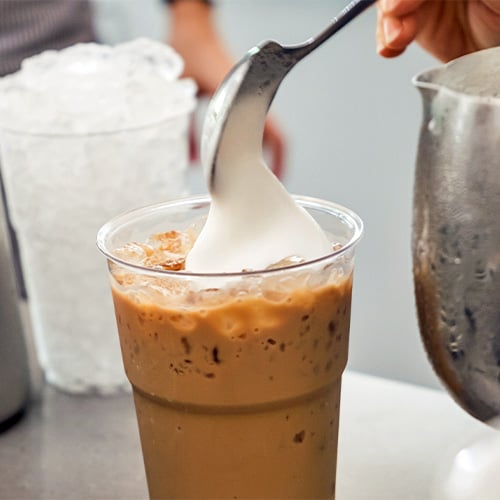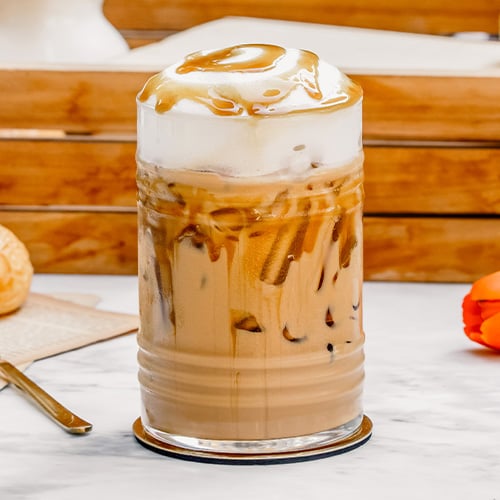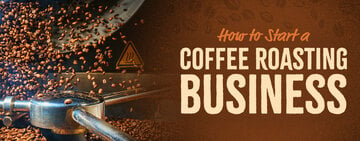House-roasted beans are becoming a fixture in local coffee shops. Taking single origin beans from far-flung locales and roasting them yourself is the perfect example of the glocalization movement. Glocalization is the call to adapt global and international products to the local contexts where they’re used and sold. But are roasting businesses just the latest coffee trend? Buzz aside, roasting coffee beans in-house allows cafes to offer superior beverages and diversify their sales by offering their roasts a la carte or as a part of a coffee subscription service. Whether you’re operating a coffee shop and want to add house-roasted beans to your wheelhouse, or you’re wondering what it takes to roast coffee beans professionally, we guide you through the steps of starting a coffee roasting business.
Shop All Coffee Roasters
Use these links to jump to the step of starting a coffee roasting business that interests you:
Coffee Education
Branding
Business Plan
Startup Costs
Licenses and Permits
Insurance
Location
Supplies
Website
Advertising
How to Roast Coffee Beans Professionally
60% of coffee consumed in the U.S. is from the specialty coffee market, making fresh and sustainable coffee beans an excellent opportunity for entrepreneurs. Roasting coffee beans professionally takes more than choosing the types of coffee roasts you want to make. You must acquire equipment, business permits, and marketing strategies. Implement these steps to start roasting coffee beans professionally.
1. Coffee Education
Before starting a coffee roasting business, you should have foundational coffee knowledge. From brewing with a French press to an espresso machine, master brewing methods so you can test your coffee beans with each. Consider investing in professional cupping and roasting courses. The Specialty Coffee Association (SCA) offers a sensory skill module that helps new roasters identify green and roasted coffee defects and flavor characteristics. If you want thorough knowledge, the SCA’s comprehensive coffee skills education program is right for you.
Beyond coffee coursework, taking marketing classes allows you to handle promotion yourself. This makes starting a coffee roasting business more affordable since you won’t have to pay marketing professionals high salaries. The more skills you develop before starting your coffee roasting business, the fewer roles you’ll have to outsource. Once your business is off the ground, you can bring on these staff members to lighten your load.
2. Develop Your Coffee Brand
Having a clear and definable brand for your coffee roastery attracts and retains customers. Branding is the process of communicating your values, mission, personality, and identity. It should be evident in your customer service, packaging, marketing, and products. For example, if you roast fair trade coffee beans, your branding should reflect your dedication to ethical and sustainable sourcing. Including information about your brand on your coffee roasting website and packaging is a great way to help like-minded patrons connect with your brand.
One branding idea is to focus your coffee roasting business identity on coffee tourism. Just like wine enthusiasts travel to destinations renowned for their wine production, many coffee enthusiasts are visiting countries where coffee is grown. Your state-side coffee roasting business can tap into the coffee tourism trend by offering multiple single origin roasts from other countries. Provide information on the country the beans came from, photos of the coffee farm, and curated snack pairing kits for a coffee stay-cation experience.
3. Write a Coffee Roasting Business Plan
Having a thorough business plan is a vital step in roasting coffee professionally. It acts as a roadmap for your new business, consolidating your goals and strategies so you can convert them into action steps. A business plan will help you secure funding for your coffee roasting business because it proves to investors that you know how to make your business succeed. Your coffee roasting business plan should include the followings:
Executive Summary - The executive summary provides a brief overview of all of the information included in your business plan. You will need to write it last after you have the rest of the information.
Company Description - Your company description expands on the specific strategies and projections provided in your executive summary.
Concept and Products - Explain what concepts you have chosen for your coffee roasting business, which types of roasts you’ll sell, and any subscription services you plan to offer.
Management and Ownership Structure - Discuss what type of ownership your coffee roasting business will have and explain its managerial structure.
Employee and Staffing Needs - Outline how many employees you’ll need to operate your coffee roasting business, and which positions you must fill.
Marketing and Competitor Analysis - Identify a target market and complete a comprehensive analysis of your competitors. Then highlight potential competitive advantages.
Advertising and Marketing Strategies - List potential advertising and marketing methods that will entice customers and establish brand loyalty.
Financial Projection and Summary - Outline sales projections, perform a break-even analysis, and list potential expenses.
For an in-depth guide to writing business plans, check out our restaurant business plan guide.
Back to Top
4. Raise Coffee Roasting Startup Costs
While not as expensive as opening a coffee shop, starting a coffee roasting business still requires capital. A Specialty Coffee Association study determined that on average, a roaster wholesaler and retailer business owner will need $120,000 to cover startup costs. Discover the basic elements you must pay for when starting a coffee roasting business.
Location Down Payment - The great thing about a coffee roasting business is you can operate out of your home with the proper licenses and permits in most states. If you’re adding a roasting business to your coffee house, you can make room for your roasting machine without purchasing additional space. However, if these aren’t options for you, you must purchase or rent a location to roast your coffee beans. If purchasing your location, you’ll likely take out a loan to help cover the expense. Expect to make a down payment of around 15-20%.
Property Renovations/Construction Costs - Whether you’re purchasing a location or operating from home, be prepared to spend money on renovations. Many states allow entrepreneurs to roast coffee from home as long as the part of their home where they will roast the coffee meets state-specific criteria. Expect renovations to bring your space up to your local health department’s standards.
Coffee Roasting Equipment - Your primary cost will be the commercial coffee roaster. A commercial coffee roaster can cost anywhere from $20,000 to $150,000. While you may not require a large unit when you first start out, we recommend purchasing the largest and best roaster you can afford. As the most essential element of your new business, you don’t want to quickly outgrow or wear out your coffee roaster.
Coffee Roasting Supplies Inventory - You must factor in the costs of green bean sourcing, packaging, and shipping supplies into your startup costs. As you test and develop your roasts, be prepared for a large amount of initial green bean waste.
Employee Wages - You may be able to handle much of the coffee roasting process yourself when you first start out. However, if you plan to run a larger operation, you’ll need employees and staff. With the rise of staffing shortages, be prepared to pay fair wages.
Advertising - An advertising budget is needed to run marketing campaigns and attract new customers.
Permits and Licensing - Coffee roasting businesses require several permits and licenses, many of which come with fees.
POS System - A POS system streamlines the ordering process, inventory management, and sales reporting.
Website - Creating a website where patrons can order coffee beans is essential to your success. Provide information about your supply chain, products, and brand, so customers see your value.
5. Get Business Licenses, Permits, and Certifications
To start a coffee roasting business, there are several licenses, permits, and certifications you must acquire. We break down the official standards you must meet to roast coffee beans professionally.
EPA Requirements - Since volatile organic compounds and harmful particulate matter are released during the roasting process, the Environmental Protection Agency (EPA) in many states requires roasters to have Air Permits if they roast high volumes annually. Check your local EPA requirements to see if an Air Permit is required for your coffee roasting business.
FDA Requirements - According to the Food Safety Modernization Act (FSMA), any facility that manufactures, processes, packages, or holds food for consumption must register through the FDA Food Facility Registration page and allow the agency to inspect the food facility.
Local and State Requirements - Most states have laws and regulations over the sale of food products enforced by local health departments. If your production is under a certain volume or you sell your roasts under home cottage laws, many states allow you to roast and sell coffee beans from any location with little health department oversight. Most cottage laws do not allow you to sell food online. However, other states require professional coffee roasters to use a commercial-grade kitchen and require random health department inspections. Check your local and state requirements to make sure you’re in compliance.
General Business License - While some states require a general business license or permit to roast coffee beans for sale, these licenses are usually found at the city level. Check your local requirements.
Form a Business Entity - You must select a legal entity that defines how your coffee roasting business is organized. You have four options: proprietorship, partnership, corporation, and Limited Liability Company (LLC).
Business Name Registration - Many states require owners to register their business name. The process of registering your business name varies by state and the type of business entity you chose.
Employee Identification Number - Before you can hire staff, you must get a nine-digit employee identification number. Every business in the United States has a unique employee identification number.
Sales Tax Permit or Business Number - A state sales tax permit (aka business tax number or tax ID number) may be required to sell roasted coffee beans. If necessary, you’ll create an account number with your state’s taxing agency so they can collect and remix the sales tax.
Resale Certificate - A resale certificate (aka seller’s permit) allows you to purchase inventory that will be resold to customers tax-free. When a business owner has a seller’s permit, they won’t pay the sales tax to the vendor they purchase their inventory from. The sales tax is charged to the end-user of the product instead.
Occupancy Certification - Most cities will require your coffee roasting business to have a Certificate of Occupancy (CO) before operating out of a commercial building. It is usually offered by the city and county. Before you receive the CO, the building must comply with zoning regulations, building codes, and any additional local requirements. If you’re operating your coffee roastery from your home, you may need to obtain a home occupation permit. Check your local laws and regulations to make sure you’re in compliance.
What Is Fair Trade Certification?
The Fair Trade certification confirms that a product’s social, economic, and environmental aspects of production comply with Fairtrade Standards for Producers and Traders. As a coffee roasting business, it’s worth obtaining a Fair Trade certification, proving to your clients that your coffee promotes fair pay and ethical treatment of the producer groups in developing countries that exported your green coffee beans. Consumers are willing to pay approximately 3.62% higher premium for Fair Trade Certified coffee, so having a Fair Trade certification can earn you greater profits in the long run. It also sets your coffee roasting business apart from competitors, and it can earn customer loyalty from patrons who appreciate your efforts to promote an equitable global economy.
6. Invest in Business Insurance
Insuring your coffee roasting business protects against workplace injuries, property damage, and claims of product liability. General liability insurance is the best insurance for most coffee-roasting businesses. The average coffee roaster spends between $500 and $1,200 to have general liability coverage for $1 million. Your location, number of employees, deductible, general aggregate limit, and per-occurrence limit will determine the price of your general liability policy. Some providers may offer a discount on your general liability policy if you purchase it as a part of a business owner’s policy (BOP).
Back to Top
7. Secure a Location for Your Coffee Roastery
You must find a space large enough to accommodate your coffee roasting equipment and provide enough room for you to safely roast, package, and ship your coffee beans. If you’re a micro roaster, you won’t require a large commercial space to operate your coffee roasting business. As long as cottage laws in your area allow it, an up-to-code basement or garage will work as a location for a small roasting business. As your business grows, you may require a larger space. There are commissaries that allow you to pay for timed access to commercial roasters. This allows you to complete large orders without having to invest in your own commercial space.
8. Purchase Coffee Roasting Supplies
It’s time to purchase the coffee roasting equipment and supplies you’ll need to start roasting coffee and selling it to customers. We’ve rounded up the essential supplies required to start your coffee roasting business.
Coffee Roaster - There is a wide range of coffee roasters on the market, but most small roasting businesses can start with a 5 kg capacity classic drum roaster. Choose a model that is compatible with helpful roasting software for the best outcome.
Unroasted Coffee Beans - Having a steady supply of green beans you can roast will be essential to your business. Decide whether you want to focus on a particular region of origin or offer blends of different beans.
Coffee Bags - Custom coffee bags build brand identity, but if you don’t have the funds when you first start out, purchase flavor-conserving, wholesale recyclable coffee bags. Your first customers will care more about the quality of your product and the sustainability of your packaging than a cool design.
Bag Sealer - A reliable bag sealer allows you to seal your roasted coffee inside your bags so it can be sold to customers. We recommend choosing an automatic bag sealer that adds the roasting date to the bags.
Sample Roaster - A small sample roaster allows you to test your roasts and judge their quality without wasting all your green coffee beans on a large batch if it doesn’t turn out well.
Bean Trier - A bean trier is an instrument that pulls a sample of beans from a coffee roaster so you can view their shade and smell their aroma. It is a long tool shaped like a wand with a hollow shaft that has a slot in it. Roasters insert the bean tier into the beans, rotate it, and collect coffee into the shaft. Roasters can then place the bean trier under a spotlight to evaluate the roast shade.
Spotlight - To accurately determine the color of your roast, mount a spotlight with a full-spectrum bulb above your bean trier.
Color Meter - For true color accuracy, invest in a color meter. A color meter analyzes the degree of roast, allowing you to create a consistent product.
Moisture Reader - A moisture reader reveals how coffee was prepared, how its quality might alter over time, and how it will respond inside the roaster.
Scales - You will use scales to weigh green coffee before roasting it, ground coffee before taste testing, and roasted coffee beans before packaging them for your customers. You’ll need a scale with a high weight capacity and a large weighing platter. Look for a unit that is accurate to 0.1g.
Coffee Grinder - You’ll need a reliable grinder with adjustable grind settings so you can test your roasts in every grind size.
Coffee Brewer - You must have a brewer to test your roasted beans with. Pour over and French press brewers are popular choices. Make sure you can test the method your core customers will likely use.
Coffee Roasting Software - There is a lot of wonderful software to help you roast coffee. For the new roaster, Artisan is an excellent choice. It’s free, open-source software compatible with over 30 types of roasting machines and over 50 associated devices. For advanced roasters willing to pay for their software, Cropster is a comprehensive tool that helps roasters with monitoring their inventory, production, planning, quality control, and manage the buying and selling of green coffee online.
Cleaning Supplies - You'll need to maintain a tidy space and thoroughly clean your equipment.
Safety Equipment - Protect against injury by providing safety supplies. Help reduce the risk of fires by adding a water line with a spray head and an accessible valve.
Shipping Supplies - If you plan to run an e-commerce coffee roasting business, purchase shipping supplies so you can fulfill customers’ orders.
9. Create a Website for Your Coffee Roasting Business
Having a navigable website is essential to your success. Make sure your product pages offer ample information to guide people. Use descriptive words so customers understand each roast’s flavor profile. Consider offering interactive quizzes to help patrons find a roast they’ll like.
Your coffee roasting website should reveal who you are as a brand and guide patrons to purchases. Provide information on your sustainability efforts and on where you source your beans. According to a Label Insight survey, 94% percent of consumers are more loyal to brands that provide supply chain transparency. Lastly, make it easy for customers to subscribe to loyalty programs and email lists from your website.
10. Advertise Your Coffee Roasting Business
You can have the best brand, premium products, and incredible customer service, but if no one knows about your business, your efforts will fall flat. Creating a social media presence is crucial to marketing your coffee roasting businesses. Each social media platform favors a different type of content. Optimize your content for each platform by following best practices for Instagram and learning how to create engaging videos for TikTok. If you have a cottage food roasting business, get involved with your local farmer’s market scene. Don’t hesitate to make in-person connections with local gourmet grocers and coffee houses to advertise your roasts.
Back to Top
Thanks to its comparatively low startup costs, launching a coffee roasting business is a wonderful opportunity for entrepreneurial coffee enthusiasts. Whether you’re a coffee shop owner interested in gaining a competitive edge or a coffee roasting hobbyist looking for a new career, refer back to our guide to start your own coffee roasting business.







